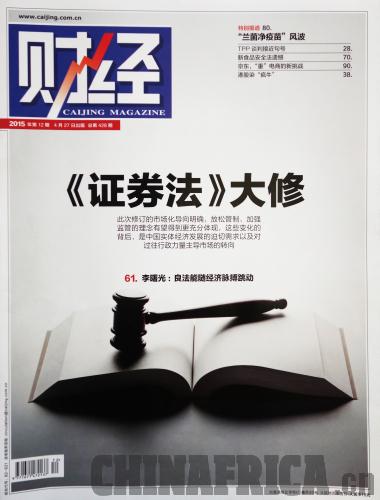|  Securities Law to Get a Makeover Securities Law to Get a Makeover
Caijing
April 27
The Securities Law is headed for a sea change with a draft amendment submitted to the Standing Committee of the National People's Congress, China's top legislature, for review on April 20. The amended law is expected to come into effect in October.
It has been 25 years since China's securities market opened with the establishment of the Shanghai Stock Exchange in 1990. Since then, the laws and regulations governing this market have been amended several times in accordance with market development.
The new amendment means profound changes, adding 122 new clauses. Another 185 clauses have been modified and 22 scrapped. The amended law will see government control over the market loosened but supervision strengthened. These changes reflect the urgent need for the development of the real economy.
There are over 40 million small and micro companies in China, yet less than 3,000 are listed on the stock market. The unlisted companies can't get funding from the capital market through direct financing. Also, it is often difficult for them to get bank loans, causing them financing difficulties.
It is therefore critical to develop a multi-layered capital market to expand direct financing. The new amendment is aimed at protecting investors' interests, stimulating market vitality, loosening government control and enhancing supervision.

Shenzhen's New Direction
China Newsweek
April 20
In the 1980s and early 1990s, economic reforms in south China's Shenzhen Special Economic Zone, focusing on increasing productivity, made great strides. During the reforms, economic restructuring played a critical role in developing Shenzhen's economy. The city has gone through three major economic transformations. The first occurred in the mid-1980s, with labor-intensive factories mushrooming, pushing the city on the fast track of industrialization. The second, which took place in the mid-1990s, focused on developing hi-tech companies into a pillar industry. The third, which happened in the new century, has seen the service industry booming.
Now, the city's growth has become increasingly innovation-driven. The presence of a number of established and fledgling enterprises can guarantee Shenzhen's leading economic position among Chinese cities.

A Sporting Way to Urban Development
Oriental Outlook
May 1
Although the real estate industry still plays a dominant role in most Chinese cities' development, in recent years, the sports industry is gradually emerging as an influence. Oriental Outlook looks at the role the industry plays in cities' economic development.
Hosting major sports events helps cities attract investment and develop tourism. For example, after the 2008 Beijing Olympics, the National Stadium and the National Aquatics Center (known as the Bird's Nest and the Water Cube respectively), built as venues for the Games, became the capital's new tourist attractions.
The government has recognized the importance of the sports industry in the country's economic upgrading. In October last year, the Central Government issued a plan to accelerate the development of the sector and turn the sports industry into an important impetus to boost the country's GDP growth.
In China, most sports events are hosted by the government. However, in January, the General Administration of Sports lowered the threshold for hosting marathons to encourage privately organized events. With a large number of participants, marathons are expected to bring considerable economic benefits to cities, given the contestants' spending on accommodation, food and shopping.
Let the Market Fix Drug Prices
Qianjiang Evening News
May 6
The Chinese Government has lifted the ceiling on the prices of most drugs from June 1 to make the pricing system more market-oriented.
The reform of the drug pricing system is a sensitive and complicated issue as it directly concerns people's livelihoods. Government-controlled pricing system, introduced in 1996, stabilized drug prices to some extent but also had flaws like corruption. Some officials in charge of fixing prices took bribes from medical companies and imposed a higher price on some drugs. It pushed up prices and increased patients' financial burdens.
The main goal of the current reform is to allow the market to determine drug prices. Since the government's control over other product prices has been lifted, its control over drug prices should also be loosened.
However, it will take some time before a market-oriented drug pricing system takes shape. Drug prices are unlikely to drop immediately after the reform. However, the prices of commonly used medicines that are manufactured by several companies may drop because of market competition. For drugs with few competitors, the government should not allow their prices to go up randomly but exercise appropriate control and supervision. |